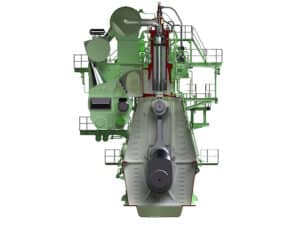
Flag state approval clears way for first conversion of LPG carrier to LPG fueling
Written by Nick Blenkey
VLGC BW Leo [Image: BW LPG]
Following acceptance of the design by the Isle of Man Ship Registry, BW LPG is to go ahead with its plan to convert the engines of 12 of its Very Large Gas Carriers (VLGC) to dual fuel LPG operation.
The conversions will be the first of a VLGC to run on LPG. After the conversion the vessels will also receive the newly developed DNV GL class notation “GF LPG.”
The flag state acceptance of the design by the Isle of Man means that the project has been demonstrated to have an equivalent level of safety to methane as a ship fuel under the IGC Code 2016.
“We are very pleased that BW LPG has recognized our expertise in this field and chosen DNV GL as the classification partner for this project,” said Knut Ørbeck-Nilssen, CEO of DNV GL – Maritime. “This acceptance is the result of all of the partners in the project bringing their exceptional competence and experience to come up with a safe and feasible solution for this innovative project. In addition, the knowledge we have gained from working on the project has resulted in us being able to release a new dedicated LPG notation, which we hope will spur the further interest and uptake of LPG as a ship fuel.”
The vessels will be fitted with two additional LPG cargo/fuel deck tanks in cargo area, so as not to compromise the cargo capacity onboard.
The ships’ MAN B&W 6G60ME-C9.2 HFO-burning engines will be retrofitted to become 6G60ME-C9.5-LGIP LPG-fueled dual-fuel engines.
The ships will use a Wärtsilä LPG Fuel Supply System (LFSS). The LFSS control system will be integrated into the ships’ integrated automation system (IAS).
Using LPG as a ship fuel results in substantial lower emissions to air, virtually eliminating sulfur emissions, and dramatically reducing particulate matter and black carbon emissions, says DNV GL which notes that, used with a two-stroke engine, LPG can also significantly cut NOx emissions and reduce greenhouse gas emissions., Retrofitting has the added benefit of extending the lifespan of the vessel, significantly reducing the overall carbon footprint compared to a newbuilding.
BW LPG plans to begin the conversions of the first two vessels, BW Leo and BW Gemini, this summer with completion scheduled for late summer 2020. The other vessels are targeted for conversion at their next drydocking periods.
“The Board and Management at BW LPG continue to emphasize a deep corporate commitment to sustainable development,” said Anders Onarheim, CEO of BW LPG. “For us, as the world’s largest owner and operator of VLGCs, this means that we invest significant resources and expertise to pioneer technology that can be used to push our industry towards decarbonization without the need for dedicated newbuilding orders. We thank our industry partners who have worked in close collaboration with us to ensure that this pioneering technology is safe and reliable for implementation.”



